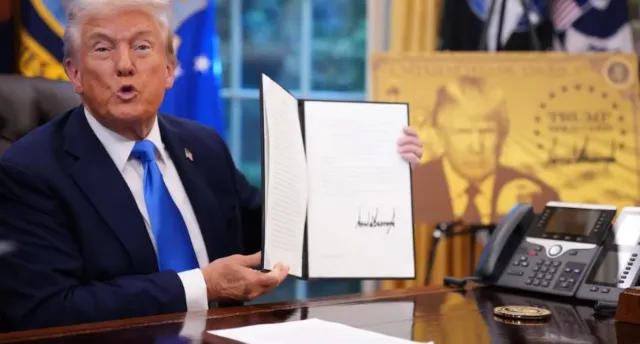
Trump Era H-1B Visa Rule: $100K Fee and Program Scrutiny
During his time in office, President Donald Trump signed a proclamation imposing a new annual $100,000 fee for H-1B visa applications. This move, among other changes to the program for highly skilled foreign workers, aimed to address concerns about its impact on the U.S. labor market.
H-1B visas are intended to attract top foreign talent for specialized jobs that tech companies struggle to fill with qualified U.S. citizens and permanent residents. However, critics argue that the program has become a channel for overseas workers willing to accept lower wages, sometimes as little as $60,000 annually, significantly less than the salaries typically paid to U.S. technology professionals exceeding $100,000.
Trump insisted that the tech industry would welcome the changes. Notably, former First Lady Melania Trump, originally from Slovenia, herself received an H-1B visa in 1996 to work as a model.
Created in 1990, the H-1B program targets individuals with at least a bachelor’s degree in fields with shortages, particularly in science, technology, engineering, and mathematics (STEM). Critics contend that the program allows companies to suppress wages and weaken labor protections. Historically, the 85,000 annual visas have been distributed through a lottery system.
In a recent year, Amazon emerged as the leading recipient of H-1B visas, securing over 10,000, followed by Tata Consultancy, Microsoft, Apple, and Google. California has the highest concentration of H-1B workers in the U.S., according to UCIS data. Detractors claim that H-1B visas often fill entry-level positions rather than senior roles requiring specialized expertise.
While the program is designed to prevent the undercutting of U.S. wages and the displacement of U.S. workers, concerns persist that companies can reduce labor costs by classifying jobs at lower skill levels, even if the hired workers possess more extensive experience. Consequently, many U.S. companies find it more economical to outsource help desks, programming, and other basic tasks to consulting firms such as Wipro, Infosys, HCL Technologies, and Tata in India, as well as IBM and Cognizant in the U.S.
These consulting firms employ foreign workers, often from India, and contract them out to U.S. employers seeking cost savings. Doug Rand, a former director at U.S. Citizenship and Immigration Services during the Biden administration, described the program as having a “split personality disorder.” He noted that only about half of the visas each year go to traditional companies offering long-term employment and a path to citizenship, while the other half are allocated to staffing or consulting firms.
Rand further explained that many of these firms, including some small operations, exist solely because of the H1-B program. These firms enter the lottery to hire individuals they then rent out to larger companies for specific projects, leading to potential misconduct within the system.
The AFL-CIO has argued that while changes to the lottery system have moved in the right direction, they do not fully address the needed reforms. The labor group advocates for awarding visas to companies offering the highest wages, rather than relying on a random lottery—a change that Trump also pursued during his presidency.
Disclaimer: This news article is based on publicly available information and may be subject to updates.
📢 Stay Updated!
For more news and updates, explore related categories below:




